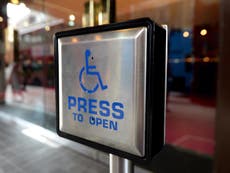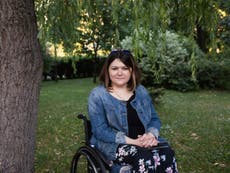I experience both ableism and misogyny too often when I go on dates
I don’t want another romantic interaction where I’m perceived to be weak and in need of saving. I’m busy, strong and assertive

Your support helps us to tell the story
From reproductive rights to climate change to Big Tech, The Independent is on the ground when the story is developing. Whether it's investigating the financials of Elon Musk's pro-Trump PAC or producing our latest documentary, 'The A Word', which shines a light on the American women fighting for reproductive rights, we know how important it is to parse out the facts from the messaging.
At such a critical moment in US history, we need reporters on the ground. Your donation allows us to keep sending journalists to speak to both sides of the story.
The Independent is trusted by Americans across the entire political spectrum. And unlike many other quality news outlets, we choose not to lock Americans out of our reporting and analysis with paywalls. We believe quality journalism should be available to everyone, paid for by those who can afford it.
Your support makes all the difference.Before coronavirus made dating taboo, I sat across from a romantic interest. We were having a good time.
I’m a disabled woman, living with inflammatory arthritis – ankylosing spondylitis, if you want to be fancy – across my whole body. It’s not a visible ailment, and explaining my health doesn’t make for an aphrodisiac on a date night. It is, however, incredibly important to communicate that my condition means I have some additional needs. I try to talk through these in the early stages of a date.
I had known this date in a platonic setting for a while, and knew I was comfortable with them. I explained some of the implications of my condition, and when they asked about my upcoming week I told them that I had quite a few hospital appointments to juggle.
Looking at me with a benign and caring look, they said: “See, you just need someone to look after you.”
I know it was meant with no malice, and it was an indication of their overly smooth flirting style, but it was also wholly symptomatic of ableism and misogyny being inseparable. I wanted to snap “I’m on a date, not an interview for a carer”.
I didn’t.
In dating – often but not always – women are laden with the “damsel in distress” trope. Not because they are in fact in danger, but because it provides men with the opportunity to fulfil the patriarchal demand to be a strong saviour type. Placing their date in a position of vulnerability means that they can indulge in this stereotype.
This is rooted in very traditional, and very misogynistic, gender norms that topple the power balance in heterosexual couples to be in favour of men. It’s inescapable; from dictations that men should earn more money and be the “provider”, to the idea that men should be physically stronger than their date so that they can care for them.
Ableist elements of our society just frame every single disabled person as weak and unassuming. Examples of this playing out in our day-to-day life can be seen in every disabled person being “an inspiration” when they do anything (I get told I’m inspirational for getting up when I’m always in pain, as though I have a choice), and from the consistent infantilisation of disabled people.
Ableism and misogyny sit next to each other as a toxic combination – they are the belief that a person is weak and unassuming because of their gender, and a person is weak and unassuming because of their health status. When you tick both of those boxes, it creates an uncomfortable power dynamic where you – in this case, a disabled woman – are suddenly placed in the “weak” box, while your date takes the “strong” one.
After the aforementioned “care” comment, icy walls went up and I immediately went into a “no, I don’t need anyone” mode. It the same mode initiated when someone offers assistance to open heavy doors or lift suitcases into plane storage, or when my field of work is explained to me.
Constant assumptions based on your persona which are rooted within traits you cannot help are painful to hold. To any person reading this and relating to the experience, you don’t need to be gentle. You’re allowed to be angry.
These misogynistic and ableist tropes are a symptom of living in a patriarchal society, where women and men are placed in a narrative of what they should and shouldn’t be. It’s a product of socialisation, not a product of being a bad person. However, that’s not an excuse to do nothing.
I don’t want another interaction where I’m prescribed assumed weakness. I’m busy, and strong, and assertive, but I’m also really tired. Sure, having a rollercoaster of a diagnostic process through my teens has shaped me in certain ways, but I like to think my condition affects me only physically. It’s easy to ignore that fact though, and to assume that it encapsulates my entire identity.
You might be able to show that you’re funny, charming, intelligent, and host a wealth of fun facts: but until ableist and misogynistic preconceptions dissipate and are no longer a factor of our society, those won’t be what is seen or understood first. Your identity is pre-formed for you as someone who is small and unassuming.
It’s easy to jump up and down and scream that this doesn’t apply to all people, and it’s true that it doesn’t apply to everyone to the same extent. However, we are all socialised within the same society that teaches us that disabled people are inferior, are weak, are helpless. The same place that teaches us that women are weak and inferior.
Only active listening and learning can take us forward and make us understand the people underneath the gender and the diagnosis.





Join our commenting forum
Join thought-provoking conversations, follow other Independent readers and see their replies
Comments